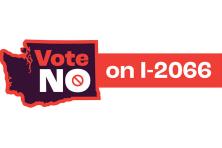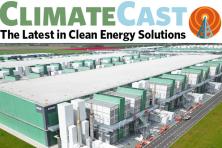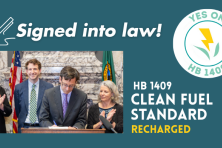Olympia, WA—Emissions from Washington’s buildings are growing at a faster rate than any other sector in the state, and Washington’s legislature has been considering a number of bills focused on accelerating cleaner buildings with various approaches including allowing utility electric appliance incentive programs (HB 1767), providing local jurisdictions with greater authority to act on energy codes (HB 1770), and addressing smaller commercial and multifamily energy efficiency (SB 5722).
With the legislature working through the weekend in 2022’s short virtual session, a few pieces of legislation passed in the Washington House of Representatives and Senate. Yet larger efforts to transition Washington’s buildings off of fossil fuels and toward the state’s 100% clean electricity continue to be met with opposition and resistance from the gas industry, setting up a familiar story of clean energy and climate struggles against the oil and fossil fuel industry. Notably Washington’s 2021 State Energy Strategy found that electrifying buildings will be the lowest-cost pathway to meeting the state’s climate goals.
Addressing building emissions is increasingly viewed as a public health issue and a way to prioritize cleaner air quality. In Washington alone, outdoor emissions of nitrogen oxides (NOx) and volatile organic compounds (VOCs)—two of the pollutants associated with burning gas specifically—cost the state an estimated $278 million and $222 million in health impact costs respectively. Gas use in buildings has impacts on indoor air quality too—with new research continuing to demonstrate the hazards of gas use indoors.
With the first major policy deadline yesterday on February 15, 2022, here’s a quick summary of what’s still moving in Olympia.
Incremental steps to increase energy efficiency and support for local action:
Over the weekend the House passed HB 1770 Stronger Energy Codes bill to address emissions in new buildings by allowing local jurisdictions to go beyond the state’s minimum energy efficiency requirements for homes, townhomes, and small multifamily buildings if they choose. HB 1770 would also ensure that all new buildings are ultra-efficient and solar-ready post-2034. The WA Senate also took action for cleaner commercial and large multifamily buildings, with a floor vote on SB 5722 to set smaller buildings on a path to optimize energy use and reduce pollution. It will also provide owners of these buildings access to technical and financial assistance, with priority to under-resourced buildings. The House and the senate environment committees will take up these bills on Thursday, February 17 in hearings.
Failed to pass: An effort to incentivize cleaning up existing homes
An effort to improve access to clean home heating options by allowing utility incentive programs failed to pass. While most clean buildings policies address new construction, HB 1767 would begin to help clean up existing buildings. HB 1767 would have clarified that public utilities could create targeted electrification programs in the interest of their customers, allowing all public utility customers to access incentives to buy efficient heat pumps regardless of their original heating source (e.g. wood or fossil-fuel). Currently only private electric utilities are able to offer incentives to switch from fossil fuels like gas or oil to electric heating appliances. While the provisions in HB 1767 were entirely voluntary, and private utilities already enjoy the authority clarified in HB 1767, a familiar cadre of voices testified in opposition to the bill including Washington’s gas utilities, business interests, and others.
Other clean buildings efforts across Washington
Upcoming effort for nation-leading clean statewide building codes
The Washington State Building Code Council (SBCC) is currently considering the adoption of a stronger energy code that includes proposals to require high-efficiency electric space and water heating in new commercial and large multifamily (over four stories) buildings. The SBCC updates and improves building and energy codes only once every three years, making 2022 a unique opportunity to adopt the most climate-friendly statewide building energy code in the country. There is broad and diverse support building across the state for these code proposals. The SBCC will be hosting a set of public hearings during its energy code update process on February 25, 2022 (overflow meeting scheduled for March 11, 2022), and will accept written public comment through March 11.
Momentum for clean and healthy buildings builds across the Northwest
Cities and counties in Washington have been increasingly looking to address building emissions to meet their own climate and GHG reduction goals, reduce maintenance and operational costs, and prioritize public health and safety. Momentum is building behind the nationwide building electrification movement and several local jurisdictions have taken action or are in progress among local governments throughout Washington.
- Bellingham became Washington’s fifth city to move on cutting building emissions, as the City Council voted to require efficient electric appliances and solar-readiness of all new commercial and large residential buildings on February 7, 2022.
- Thus far in Washington, Seattle and Shoreline have adopted policies that eliminate most uses of fossil fuels for space heating and hot water in newly constructed commercial buildings, as well as multifamily buildings that are four stories or taller, with the King County Council set to take up a similar policy early this year. Other entities like Olympia, the City of Tacoma and Seattle Public Schools have also made commitments to electrify and phase out gas in buildings.
###
ABOUT SHIFT ZERO
Shift Zero’s mission is to catalyze a just transition to zero carbon buildings for all in Washington State. We do this by advocating for policies and programs that maximize energy efficiency and eliminate emissions from buildings. As an alliance, we convene our members’ technical, policy, and advocacy expertise to identify solutions that can scale up to meet the urgency of the climate crisis. Collectively, we educate decisionmakers about how proven design approaches and building technologies can be leveraged to create affordable access to high-performance, resilient buildings. info@shiftzero.org



